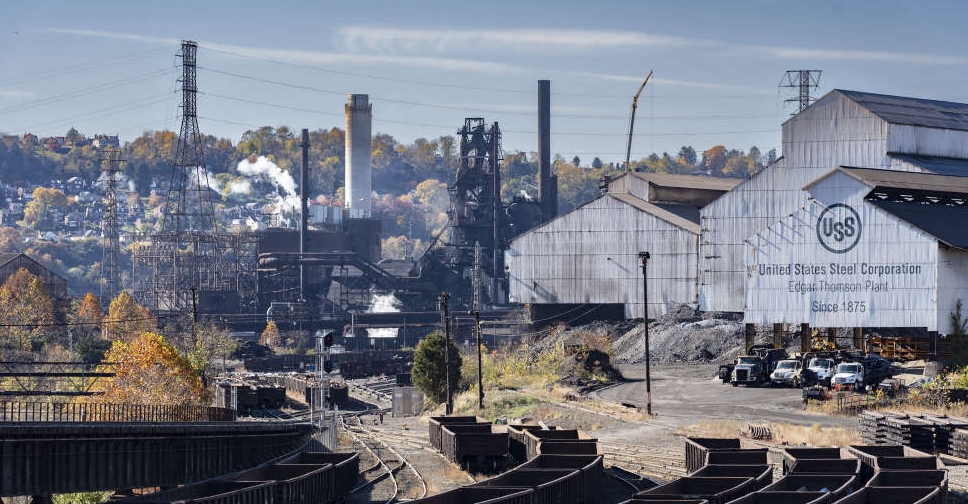
US President Joe Biden has decided to officially block Nippon Steel's proposed $14.9-billion purchase of US Steel, a person familiar with the decision said on Friday, dealing a probably fatal blow to the contentious merger plan.
The Committee on Foreign Investment in the United States (CFIUS) had previously referred the decision to approve or block the deal to Biden, who will leave office on January 20.
Biden's call to block the deal came despite contrary efforts by some senior advisers concerned it could hurt US-Japan relations, according to the Washington Post, which first reported the news.
The newspaper cited two administration officials who were not authorized to speak publicly about the matter.
The source who spoke to Reuters on condition of anonymity did not elaborate on the reason for the decision but had previously highlighted the political implications of a deal.
A White House spokesperson and a spokesperson for Nippon Steel both declined to comment on the reports.
US Steel directed Reuters to a statement earlier on Thursday saying it hoped "Biden will do the right thing and adhere to the law by approving a transaction that so clearly enhances US national and economic security."
Nippon paid a hefty premium to clinch the purchase of the No.2 U.S. steel producer in a December 2023 auction, but the deal faced opposition from the powerful United Steelworkers union (USW), as well as politicians.
Biden has said he wants US Steel to be domestically owned and run, while President-elect Donald Trump has vowed to block the deal after he takes office in January.
Japanese Prime Minister Shigeru Ishiba urged Biden to approve the merger to avoid marring recent efforts to strengthen ties between the two countries, Reuters reported in November.
Japan is a key US ally in the Indo-Pacific, where China's economic and military rise has raised concerns in Washington, along with threats from North Korea.
It is also the biggest investor in the United States and Keidanren, Japan's key business lobby, has previously aired concerns that the review was facing political pressure.
Alistair Ramsey, vice president of steel research at consultancy Rystad Energy, said blocking the deal may dissuade international investors from bidding for politically sensitive US companies with a unionized workforce in the short term.
"Big bids are a risky idea less than 12 months from a presidential election, but big steel producers with traditional operating furnaces, such as Nippon Steel, see the US as an excellent place to produce steel in the long term, despite the market depression there.
"Other mature regions, such as the European Union or United Kingdom may wish to try to build a similar reputation to inspire these investments in future."
Nippon has vowed to fight any decision to halt the deal in the courts but Nick Wall, M&A partner at Allen & Overy, said the company would struggle to mount a legal challenge.
"Who are you suing? Are you suing CFIUS? Are you suing the president? Are you suing the broader government? I think it would be near impossible," he said.
The two companies had sought to assuage concerns over the merger. Nippon offered to move its US headquarters to Pittsburgh, where the US steelmaker is based and promised to honor all agreements in place between US Steel and USW.
This week, a source familiar with the matter said Nippon Steel had also proposed giving the US government veto power over any potential cuts to US Steel's production capacity, as part of its efforts to secure Biden's approval.
"It is difficult to fully understand the risks involved in Nippon Steel's potential acquisition of US Steel," said a Japanese government official, who spoke on condition of anonymity, as did the other sources.
"Nippon Steel has done everything to eliminate risks related to economic securities, including committing not to reduce production."
Nippon Steel faces a $565-million penalty payment to US Steel following the deal's collapse, set to prompt a major rethink of its overseas-focused growth strategy.
With the acquisition of US Steel, Nippon Steel aimed to raise its global output capacity to 85 million metric tons a year from 65 million now, nearing its long-term goal of taking capacity to 100 million tons.
METI, Japan’s industry ministry, and a spokesperson for Ishiba could not be reached to seek comment on Friday, a public holiday in Japan.
Japan's stock market was also closed for the holiday. US Steel shares closed down 4.1 per cent on Thursday.



 Netflix shares jump as subscribers surge
Netflix shares jump as subscribers surge
 Economy Minister highlights UAE's business ecosystem at Davos 2025
Economy Minister highlights UAE's business ecosystem at Davos 2025
 ADNOC Distribution expands service station solar power project
ADNOC Distribution expands service station solar power project
 Emirates cancels Houston flights due to severe weather
Emirates cancels Houston flights due to severe weather

